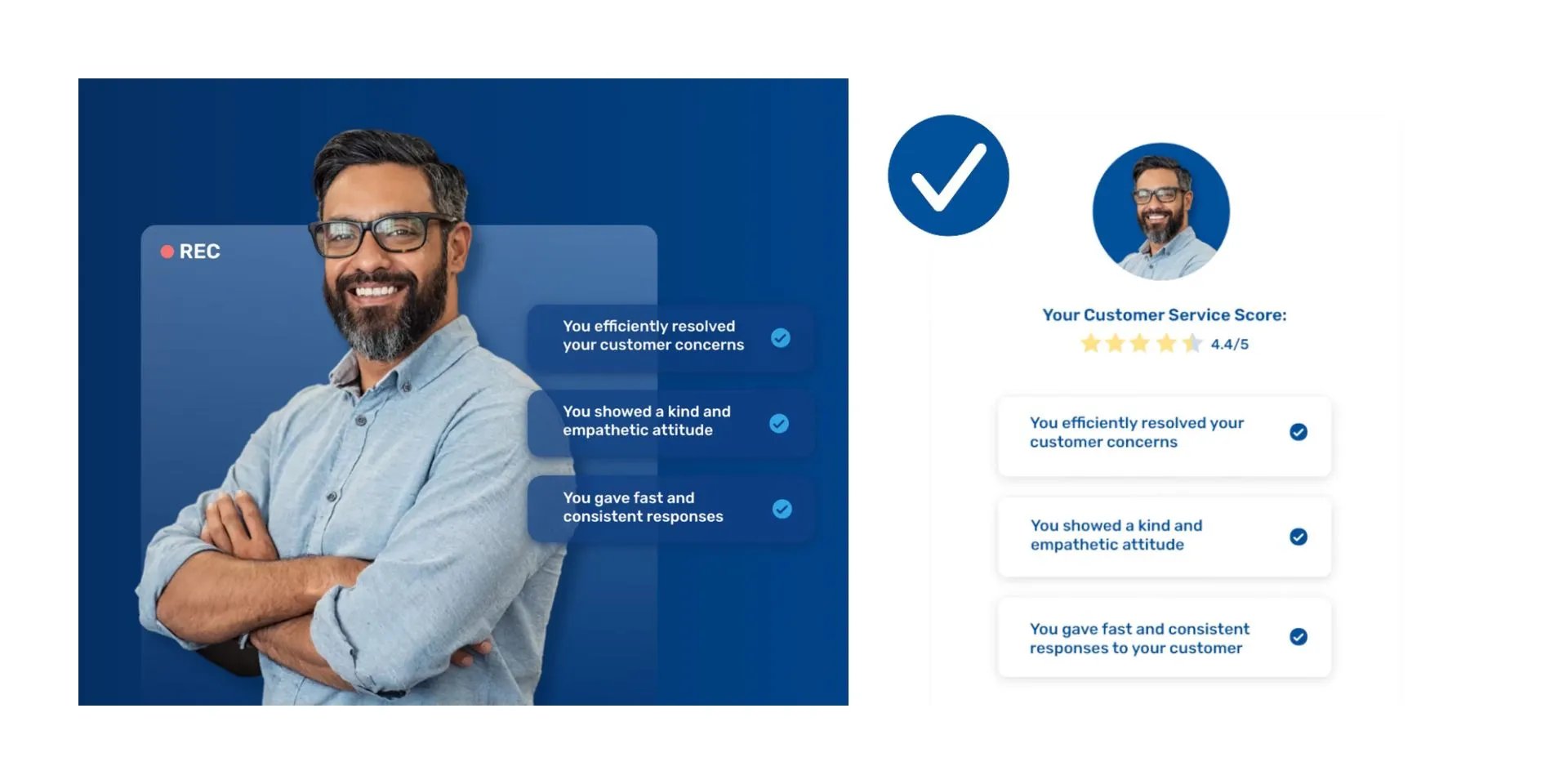"Being on par in terms of price and quality only gets you into the game. Service wins the game."-Tony Alessandra
Having good customer service training to keep your employees up to date is a necessity to achieve a top-notch brand reputation in your industry.
According to XMI's customer insights report In 2020, on average, only 15% of customers [1] forgive a company for very poor customer service and 32% forgive for poor customer service. This means that if a customer's experience with the service is poor or very poor, the loss of a potential loyal customer could be permanent.
To prevent permanent loss potential, companies that seek improvement must implement correct customer service training courses into their operations to reduce employees' poor customer service skills.
With this article, you will learn the different types of customer service training, understand the main soft and hard skills your reps should gain after the arranged training program, and finally choose the correct solution for your organization.
| Key Insights |
|
|
|
|
Table of contents:
-
What are the importance and benefits of excellent customer service training?
-
Which soft and hard skills should your employees gain after customer service training?
-
Customer service training courses vs Personalized AI coaching
What is customer service training for employees?
Customer service training aims to educate and improve the quality of customer service teams to provide fulfillment to customer expectations, and it is one of the key components for the success of an organization.
Customer service training ultimately aims to increase customer satisfaction by providing advanced product knowledge, conflict resolution skills, and the ability to communicate effectively with the customer service reps of organizations. This training should not be a singular workshop or an event but should be ongoing training to ensure the continuing professional development of a customer service representative.
What are the importance and benefits of excellent customer service training?
Whether a new hire or an existing employee, it may feel like customer service representatives are expected to understand customer care as an employee; however, positive customer experience and good customer interactions are only possible through excellent customer service training.
Well-planned training will instill the importance of a customer-centric, empathetic, and creative approach to the employees. The customer support team that goes through this well-planned training will establish why resolving customer complaints or making an unhappy customer happy benefits the company as much as the sales or marketing operations, if not more.
Here are some of the critical points why good customer service training is needed for a successful customer service team:
Good customer service is the key to gaining a competitive advantage.
Customer service rep who has good knowledge of training materials will have a comprehensive understanding of how a competitive advantage could be gained if they manage to exceed customer expectations.
While the need for good customer service may seem apparent, many companies still struggle to implement good customer service training into their operations. Starting or maintaining a planned coaching could already get a company miles ahead of the competition.
3 out of 4 people tend to forgive companies after a bad experience with the product; and if bad customer service follows up the bad experience with the product, the rate of customer forgiveness drops to 1 in 7 which is an unacceptable number for a company.
This means that while a small number of people don't stick around after a bad experience with the product, the majority of the customers could be won over by good customer service, which would ultimately put you ahead of your competitors who provide subpar service.
To retain customers, delivering excellent customer service is necessary.
Delivering excellent customer service is the most important element of customer retention. Today's customers want to stick to a company for a product in the long run, but only if the company can deliver excellent service for it. This means that exceptional customer service will not only improve the reputation of new customers but will also amplify the enthusiasm of an existing customer to be loyal to the company.
To deliver excellent service means having certain approaches to customers.
Based on Oracle's customer insights report, 73% of customers [2] need friendly employees or customer service reps to become repeat business of a company.
As well as this, %36 of customers stated they need personalized experiences to be committed to a brand or a company. This indicates that customers who expect premium service specifically want a personalized experience, as personalization is a key factor in making a customer's experience meaningful.
If the companies can then provide personalization to all customers rather than the 36% that want it, the feeling of receiving good customer service will turn a regular customer into a repeat business for the company.
Satisfied customers turn into brand champions.
If companies understand customer expectations and know how to retain customers as explained above, it is possible to turn the said customers into brand champions.
When a consumer becomes connected to a brand, this connection can lead to advocacy for the brand, one of the outcomes resulting from this form of customer loyalty being the act of spreading positive word-of-mouth about the brand (Gremler, 1995; Anderson, 1998). [3]
Satisfied and happy customers are only possible through good customer service skills. These customers are so valuable that they are the best advertisers of a brand, sometimes even better than a marketing team.
While it is really important to gain new customers, turning your loyal customers into your brand champions is also incredibly important.
However, this is only possible through a team with good customer service skills, so it is important to ensure your team receives excellent customer service training.
 Discover how Retorio can provide your organization with an AI-powered customer service training program
Discover how Retorio can provide your organization with an AI-powered customer service training programWhat are the different types of customer service training?
When the customer service team comprehends the foundation philosophy of customer satisfaction and what is expected of them, they can react to difficult situations with a calm attitude and apply their learnings to their practices within the operation.
While a new recruit may require more comprehensive customer service training, your already-experienced team members might only need regular customer service coaching. On the other hand, your organization might also be in an emergency where every customer service staff needs training.
Here is the distinction between the three:
New hire customer service training
As well as customer service training, your new customer service reps also require complete training in product and service, company culture, and different tools used.
-
To ensure the smooth adaptation of your new hires, it is important to involve team-building exercises to help them guarantee connection with their colleagues. This will help your new hires understand the important details of the team's success.
-
One of the hardest things as a recruit is to understand what is expected from you in a company. It is crucial to establish expectations of the customer service role from the beginning to make sure they have the necessary foundation to improve the quality of the company within the customer service industry.
Make sure your employees have enough time with their customer service training exercises to fully adapt, otherwise future training materials could be meaningless with a crooked foundation.
-
New hires also require a good understanding of the tools and software being used to communicate effectively. Setting them up with their company laptops and all of the company tools ensures them be quick with their customer service skills in tricky situations
In-house customer service training
While it is naturally harder to educate new employees on customer service skills, the task of keeping your existing support reps up-to-date with strategies and products is not an easy job. The key to keeping their knowledge fresh, regardless of their experience, is to plan regular customer service training.
-
Conducting a basic skills check-in every quarter by providing appropriate training exercises to see whether they exceed customer expectations could let you know where your employees stand.
-
With the results of these check-ins, you can then create appropriate customer service training for them to stay on track.
-
Since workshops require a lot of effort to organize, your company may not be able to perform them on a regular basis. Utilizing a personalized AI coach could provide you with crucial training material as well as keep your customer service refresher training up-to-date.
Emergency customer service training
Customer service training should usually be planned beforehand. However, sometimes emergencies occur and there might not be enough training material for the specific occurrence.
Whether the occurrence is a company crisis, challenging customers, or a piece of unrelated industry news, customer support teams must react quickly to the situation with a calm and problem-solving approach.
-
Emergency customer service training prepares your first-aid team to have an "immediate response" instinct that would prevent disasters.
-
Teamwork in emergencies is the key to overcoming them, so coaching your team for good communication skills in dire situations will also improve their conflict resolution skills.
-
Keeping your customer support team regularly updated with company policies will also help keep their reflexes sharp, which could be the key solution for emergencies.
The main customer service channels
While there are different ways for customers to reach customer services, such as through E-Mail or AI bots, the majority of them still prefer to voice their complaints to a real person in real-time.
"Real-time" is crucial here. Living in the age of speed, having slow customer service is the recipe for angry customers. They are impatient and want immediate effective solutions. 90% of consumers rate "immediate response" as very important in their customer service experience.
33% of consumers [4] believe that waiting on hold is the most frustrating part of their bad customer service experience.
Additionally, 33% of customers also get frustrated with repeating themselves to different customer service reps, so positioning reps with more emotional intelligence and interpersonal skills in this branch is a good decision to prevent upset customers.
Customer service through calls
Service through phone calls is the most popular way for customers to reach companies. Since this is the point where reps communicate with customers by talking, it is important to appoint team members with the best customer service skills who will handle customer complaints with no problem.
However, solving customer complaints is not "the successful outcome" in this case, but it is to exceed customer expectations. For this, customer service training should focus on:
-
Keeping calm and being professional with even the most difficult customers
-
Having a clear, slow, and understandable tone
-
Making sure customers feel understood with an empathetic approach
As well as the customer service coaching, these reps should also be encouraged to attend more team-building events as they might need positive social time with other colleagues.
Customer service through live chat
Customer service through live chat is the modern equivalent of a phone call version. While most customers prefer to reach companies through phone calls, Gen-Z and Millenials prefer to contact companies through live chat.
Since these generations are quite vocal about their opinions online, it would understandably be a good idea to plan a customer service course where reps understand how to approach and handle the problems of Gen-Z and Millenials.
Since it is not possible to make the customers calm down with a soothing tone, it is important to have training on keywords that make the customer feel understood.
The usage of written language and grammar might also be overlooked when it comes to live chat reps. Since they communicate customer complaints by typing, it is important to have regular written language check-in with these employees.
 Learn more about Retorio's AI coaching platform to analyze and improve the performance metrics of your customer service operations.
Learn more about Retorio's AI coaching platform to analyze and improve the performance metrics of your customer service operations.Which soft and hard skills should your employees gain after customer service training?
The main goal of customer service training is to instill permanent soft skills and hard skills in your employees. At the end of their training, it is important to see whether the reps have acquired the desired qualities or not.
Here are the soft skills and hard skills your reps should have at the end of the training:
Soft skills
1. Attentive listening
-
Your reps should be able to listen attentively. Understanding the root of your problem can't be done without attentive listening; and without attentive listening, it is impossible to find the root cause to handle customer complaints.
-
Attentive listening also makes your customers feel special and valuable. Customers who feel like they are being listened to and understood will feel happy about the company which will result in the increased quality of brand image.
2. Confidence
-
The most important aspect of having confidence in customer service is the ability to communicate without hesitation. Hesitation can be felt through any type of service channel, and it is not a good idea to appear hesitant to customers.
-
Confidence also plays a crucial role in controlling the conversation. The customer service team will always be in control of the conversation, without confidence it is not possible to control the interaction.
3. Communication
-
Clear communication is a soft skill that every customer service rep should have throughout their career. Making customers understand the solution or the necessary action with the least sentences possible is beneficial for both the rep and the customer.
Talking to a service rep who does not communicate clearly as a customer is incredibly frustrating, thus communication should be one of the core skills.
-
Condescending the customer is also a crucial mistake made by the customer service team, so it is important to communicate effectively without coming off arrogant.
4. Positive attitude
-
As opposed to arrogance, a positive attitude will be quite helpful in meeting customer expectations. Negative approaches such as "Unfortunately" or "I'm afraid" could be unsettling to customers so it is better to use phrases like "I would love to" etc.
-
Although the goal is to resolve the issue, it is not always possible to do so. Having a positive attitude, however, will still partially satisfy the customer even if they received poor service with the product.
5. Empathy
-
Empathy is the key soft skill to exceeding customer expectations and providing great service. The best way to resolve customer complaints is to personally understand why they are having the issue and understand the frustration the issue causes.
-
Performing empathy training will help you identify why your reps are lacking empathy skills in customer service and how to overcome them with specific empathy exercises.
6. Creativity
-
Just as in many other fields, creativity unlocks the ability to get out of tricky situations with customers. With the creativity gained from the training, the team will be able to have better conflict-resolution skills.
-
Creativity also lies at the center of the rest of the soft skills. A rep who understands the ways of being creative thanks to training will also be confident, will communicate well, and have empathy for customers.
You may also be interested in 10 Essential soft skills to succeed in customer service
Hard Skills
1. Conflict resolution
-
At the end of the day, resolving customer complaints is the main duty of a service rep. Dealing with angry customers constantly without having conflict resolution is unhealthy for both a company and a human being.
It is crucial to identify whether your members improved their conflict resolution skills after the training. Lack of this hard skill means unresolved problems, which is the bane of customer service.
2. Company product knowledge
-
Reps who do not possess company and product knowledge will not be able to operate not only customer service but also everything else within the company. This type of training is one of the earliest to give to employees.
-
Customer service representatives who extensively learned about the company's product automatically mean an increase in creativity and conflict resolution thanks to the comprehensive knowledge of the product.
3. Customer service philosophy
-
As a result of the customer service training, your reps must absolutely comprehend the company philosophy of customer service. Without understanding how the company's philosophy works, any effort or good performance would carry less meaning.
-
Understanding the philosophy also improves customer feedback. While customers are quite reluctant to give negative customer feedback, the customers feel and understand a well-established customer service philosophy that enables them to give positive feedback.
Customer service training courses vs Personalized AI coaching
| Customer service training courses | Personalized AI coaching | |
| Consistency | Organizing a customer service training course could be time-consuming. Whether it's workshops or in-person training, it might be hard to implement courses into an already packed schedule. | Since AI coaching would not require the struggles of regular customer service training courses, employees could take more training in a calendar year compared to regular training. |
| Accessibility | Although having workshops and training seminars are beneficial in many ways, they can be extremely time-consuming and exhausting to attend consistently. This, unfortunately, reduces the accessibility | Personalized AI coaching, on the other hand, could be as far as a mouse click from employees. The extra time spared from utilizing AI coaching could be benefited elsewhere by both managers and employees. |
| Cost | Arranging training materials, organizing the events, and getting the right people to do it could be extremely costly for organizations. | Online AI coaching, however, is significantly less costly than traditional training. |
Traditional training could be beneficial for companies when it comes to significant scenario changes such as new roadmap or new legal guidelines. However, when it comes to function-essenced training such as customer service training, personalized AI coaching could be the solution for consistent and high-quality training for organizations.
With Retorio's AI-powered behavioral intelligence platform, you can assist customer service reps in unleashing their full potential by providing them with a personalized coaching plan that analyzes their strong points and sections to upgrade.
By using the power of data, Retorio's AI-driven training platform analyzes the skill gaps of each individual and immerses them into specific AI video role-plays that train them to respond, react, and behave professionally and effectively in various scenarios.
Here are some of the industries where companies utilize Retorio's coaching platform:
Industry-specific examples
Automotive
Retorio's client, who is one of the world's biggest premium automotive manufacturers, is currently going through a transformation to provide high-quality services and new product lines(Electric Vehicles) to customers who demand "automotive 2.0".
To improve its customer service and sales operations, Retorio provided the said client with an employee-centric form of training.
Today, thanks to Retorio's platform, sales and customer sales reps of our clients can practice everyday customer interactions to meet customer expectations, anytime and anywhere they need.
Telecommunications
For our client, one of the largest companies in the telecommunications industry, optimizing the call center recruitment process and building up new employees coherently to provide excellent service was a substantial obstacle for them to overcome.
The incorporation of Retorio's AI Coaching Platform represented a notable milestone in improving the effectiveness of training through the optimization of practical training opportunities and the acceleration of the customer care department's progression towards proficiency in the telecommunications company.
Insurance
When it comes to the insurance sector, with Retorio's AI-powered platform, our partners at NÜRNGBERGER Versicherung have reported increased performance on their sales reps. Thanks to high-quality training from Retorio, the employees now take customized coaching adjusted to their schedule. The reps understood the reciprocal elements of Retorio’s training as very engaging and noticed the immediate benefits of trainees being able to train without having to “expose” themselves to others.

Ready to start your journey to customer service success now? Get started right away!
Customer relationship management(CRM) is the management of everything in a company's interconnection and relationship with prospective customers and existing customers. The aim of CRM departments is to improve customer satisfaction.
Attending customer service trainings improves the quality of an organization's customer service operations by educating reps in terms of their customer-centric approach. It equips employees with the necessary skills to effectively handle customer inquiries, complaints, and needs, leading to improved customer satisfaction and loyalty. Additionally, customer service training fosters better communication, problem-solving, and conflict-resolution abilities, ultimately improving the overall quality of service provided.
Handling an angry customer requires empathy, active listening, and a calm demeanor. Reps should begin by acknowledging their concerns and offering a sincere apology for any inconvenience. Then, they should understand the root cause of their frustration and work towards finding a solution together. Remaining patient and professional throughout the interaction is key to de-escalating the situation and turning a negative experience into a positive one.



